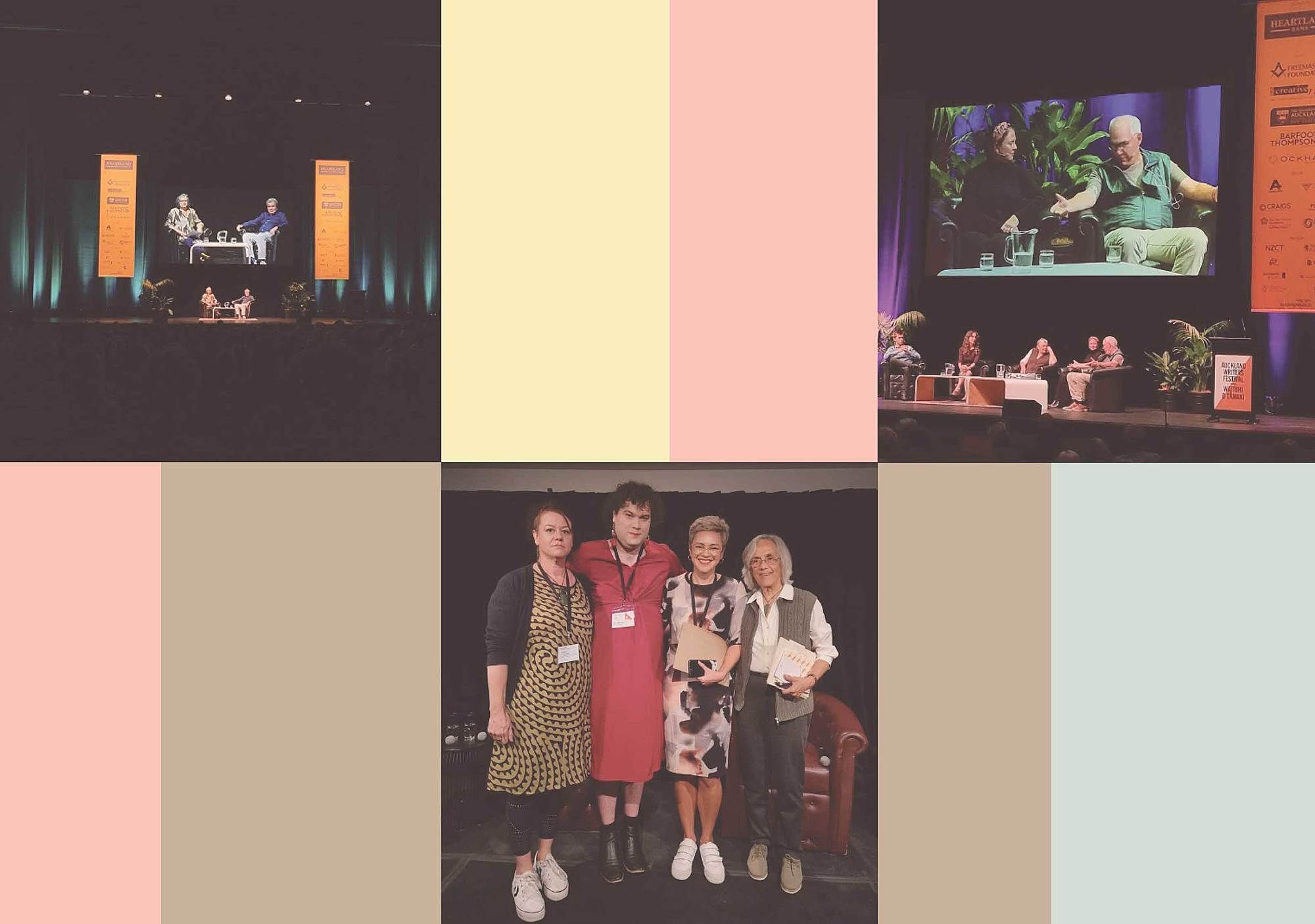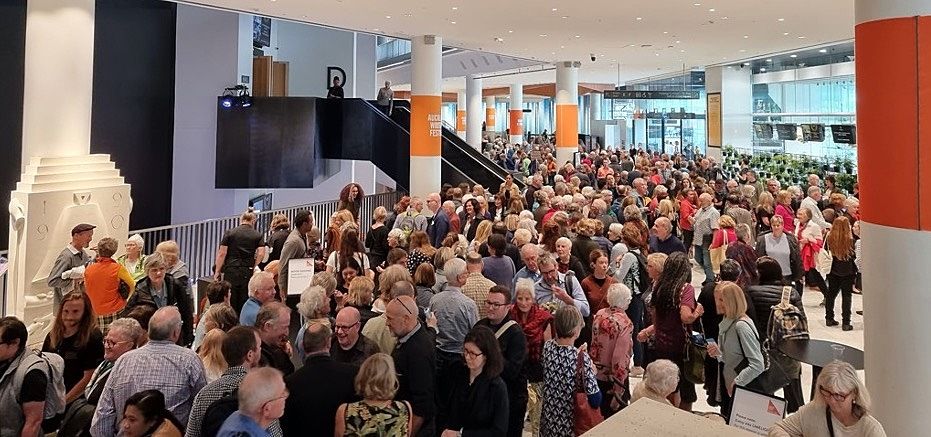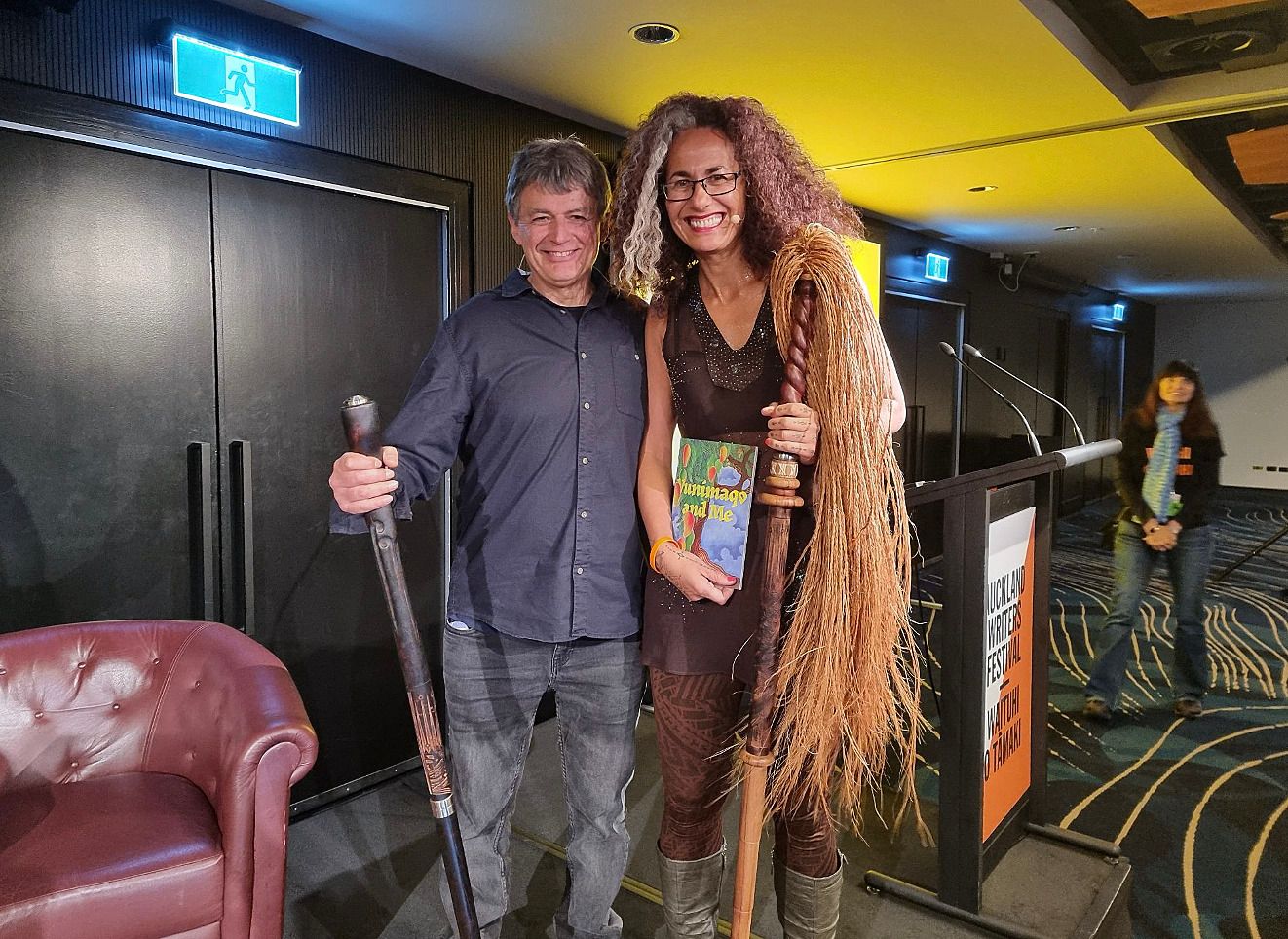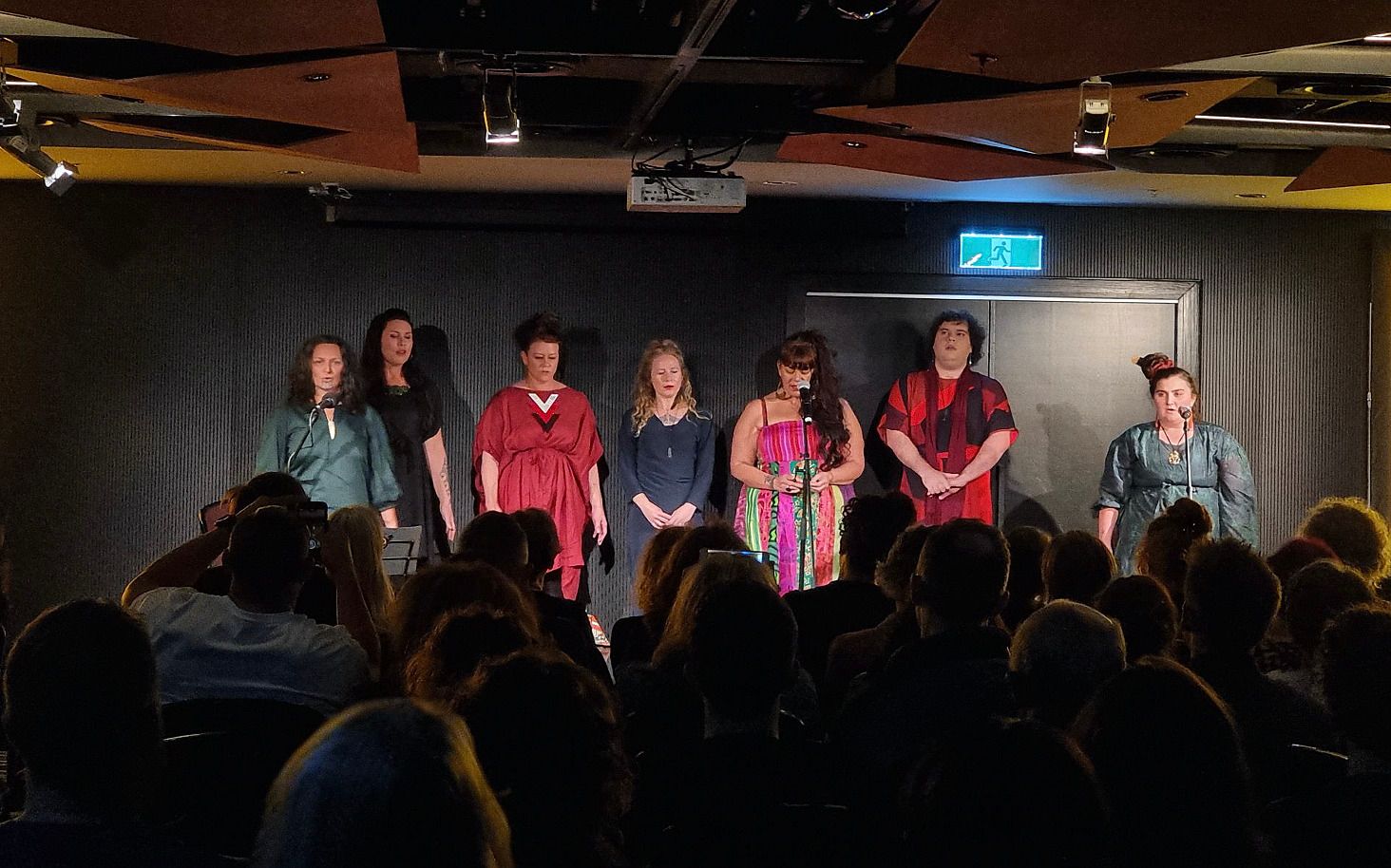Auckland Writers Festival: The highs, the lows
Ana McAllister and Ataria Sharman review the Auckland Writers Festival, what they loved, and what they didn’t.
Auckland Writers Festival 2021 was one of highs and lows – whiteness and privilege and Māori and Pacific mana on display. Two of the Pantograph whānau, our editor Ataria Sharman and staff writer Ana McAllister, descended on Aotea Centre to review various events.
Main foyer from Auckland Writers Festival.
Ana McAllister: The thing that struck me the most was simply the audience. I was an AWF virgin, and did not expect the audience to be so old, white and wealthy. Not only did the vastly Pākehā audience take up the majority of the physical space, they also took up much of the emotional and vocal space.
I overheard many interesting conversations, including one where two Pākehā women marvelled at the struggles of Māori writers, something of which they had never known. Which made me hope that perhaps this audience may learn something from this festival. However, my hopes were swiftly removed when I heard those same women laughing at the expense of Māori at another talk.
Overall, I had curated my time at AWF to ensure I saw the Māori and Pacific mana that was no doubt on full display, namely the incredible Oro series from Ruby Solly, but I also snuck in some of the whiter talks to really get a feel for the event as a whole. All in all, there were high highs, and there were low lows.
Ataria Sharman: As someone who has been to AWF once before, I wasn’t as surprised by the audience as Ana. It is as though in that one year, sadly, I’ve become acclimatised. Shilo Kino talks to a writer's festival beyond the white and privileged in this article for Newsroom. On the other hand, I was similarly super excited to see the events curated by Ruby Solly. She is a poet, writer, creative and taonga pūoro artist who has previously contributed to The Pantograph Punch. You can check out her latest piece, Hine Pū Te Hue: Wāhine of Taonga Pūoro here.
I didn’t have the lows that Ana did because I didn't attend events that I thought would trigger trauma for me as a wāhine Māori. It could be a protective mechanism, some kind of subconscious shield that means I shy away, where the courageous Ana steps forward. As an aside, I really loved bumping into some of my writer friends as well, including Anahera Gildea, Shilo Kino, Emma Espiner, Jacqui McRae and Eboni Waitere from Huia Publishers. Most importantly, being able to meet with Ana between the events, to discuss and debrief what we had seen, was an important part of the experience.
TINO RANGATIRATANGA IN PUBLISHING
Patricia Grace, Anahera Gildea and essa may ranapiri. Chaired by Emma Espiner.
This was the first talk I attended and I was pleasantly surprised to see the room was about 50/50 Pākehā to BBIPOC. Though I later discovered that this ratio made sense when considering the general audience of the festival. Emma was an amazing chair, one of the best I saw at AWF. Patricia spoke of the first hui, held in rural Aotearoa by Ngā Puna Waihanga, and how the cold Waitara nights were heated up by the fiery conversations of the artists and writers. Anahera was funny as always, and caused loud cackles from the aunties in the back (myself and Ruby Solly). essa spoke of the pukapuka Te Rito o te Harakeke and the power of Pākehā-free spaces. The talk ended with advice from everyone, notably from whaea Patricia who reminded young Māori writers to eat our vegetables, and go outside and play. –AM
A THRILLING QUARTET: BERARD, BUBLITZ, CARLYLE, SANDERS
Ray Berard, Jacqueline Bublitz, Rose Carlyle and Ben Sanders. Chaired by Stephanie Johnson.
This talk was a discussion between four thriller writers. I went mainly to hear from Ray Berard, who is the writer of Inside the Black Horse, now adapted into the TV series Vegas, which has been widely critiqued for playing into negative stereotypes of Māori. This did come up in the talk and I wish I had brought my Pākehā excuses bingo because Ray may have hit them all. He noted that he doesn’t see colour, saying, “I’m culture blind”; he “wrote this book for Māori”; and he knows a lot of Māori and all of them were ok with the book. He spoke multiple times about these Māori friends of his, which made me think, how many Māori need to take issue with the book before he takes their perspective on board, or will he only listen to those Māori friends? –AM
A QUESTION OF STYLE: GARANCE DORÉ
Garance Doré with Wendy Petrie.
I consider myself very unfashionable, which is why I was drawn to this talk by French fashion photographer and blogger Garance Doré, a woman I had never heard of before. When you struggle with style, witnessing those who appear to effortlessly embody it is quite exciting. I was somewhat inspired by this talk with Garance, born on the French island of Corsica. As a child, she would people-watch the celebrities visiting her papa’s restaurant in their finest fashion, the impetus for her eventual career in fashion photography and fashion blogging. This culminated in the New York Times bestseller Love × Style × Life. A writer that I met at AWF described Love × Style × Life as a coffee-table book, to which another writer I was with said, “I’d never want my book described like that.” I immediately thought, Is it blasphemous that I wouldn’t really mind? These days, Garance’s writing mostly consists of a weekly newsletter to a women’s community who’ve eagerly subscribed to her juicy life-updates. Although I need to subscribe to read, from the talk it seemed as though nothing is off limits, and Garance admitted that her partner isn’t on the subscriber list, so she can write what she wants. All in all, this event felt frivolous but satisfying. –AS
David Eggleton and Selina Tusitala Marsh.
HOLDING THE TOKOTOKO: MARSH AND EGGLETON
Selina Tusitala Marsh and David Eggleton.
David (The Wilder Years) and Selina (Mophead) are the only two Pacific writers to become New Zealand Poet Laureates. This talk was hilarious! Selina’s wit and large smile beautifully juxtaposed with David’s serious tone. These characteristics were mirrored in their tokotoko, and I’m sure Selina would like me to note here, not only is hers bigger, but it can also fly. The talk started with a poem from Selina “in the style of David Eggleton”, which was a beautiful expression of whakawhanaungatanga and a great way to introduce both writers to those who may not know them. David spoke of the gentrification of Ponsonby, and I thought I felt a tension in the chests of those same gentrifiers as they sat in the room. There was a conversation about being afakasi and the power of living in multiple worlds, and how performance poetry is rooted in the chants of Pacific culture, traditional rhythms, verbal doodles and graffiti. –AM
A CONVERSATION WITH MY COUNTRY
Alan Duff with Paula Morris (CW racism, lateral violence, fatphobia, classism).
Ok, this is a lot to unpack. This talk was meant to happen last year, after the release of Alan’s book A Conversation with My Country, which I am yet to read. It was a truly disturbing experience, and made me feel as though I was a character in the horror movie Get Out. What transpired was an hour-long session of an almost entirely Pākehā audience laughing at Māori. I do not wish to analyse Alan too much as I don’t have the word count, so instead these are the most outrageous moments, which all received at least laughter, and most of the time applause, from the audience:
- He described living in a Māori community (namely Whakarewareawa) as an “unexamined life”, of which he said there is nothing worse.
- He criticised the housing of homeless people in hotels, without offering an alternative solution.
- He referred to Māori leaders as “tokotoko-waving wankers”.
- He described himself as “more Māori than them [academics]”, and then went on to say, “I’m an action man, you won’t see me doing a haka and huffy walk-outs”, which received applause from the crowd. “You see Mr Waititi, you ain’t got no friends here bro”, only heightened their applause.
- In a discussion of how Māori have higher rates of diabetes, he said, “Has anyone considered telling them to eat less?”
I find it interesting that in casual conversation Alan is happy to remove his Māori identity like an oversized winter coat, often using the words ‘them’ or ‘they’. And I observed that in every other talk I went to, the Pākehā laughter was that low polite hum that they do. But in this talk they felt comfortable and confident enough to laugh with their full puku. At us. I think that's really all that Alan does now, he emboldens them. –AM
FROM THE CENTRE: PATRICIA GRACE
Patricia Grace with Nic Low.
Patricia Grace is one of those kuia who have what I call ‘soft staunch energy’. She has a power that simultaneously says, I give the best hugs, and I will fight with your high-school principal if they wrong you or our whānau. And evidently whaea Pariticia has taken on even more formidable foes in her life. She spoke of her whenua and the various people who have tried, over the years, to come in and take the land. She told of one such story where the council wanted to put in a container port on her whenua. When the council proposed this to the tāngata whenua, they said, “This is going to be so good for your community, you’re all going to get jobs!” To which Grace and her whanau replied, “We already have jobs.” To this day, the whenua remains with the whānau of that area, now cemented by the building of Hongoeka Marae, which Whaea Patricia helped fundraise for and build. When Nic Low asked whaea Patricia about her mahi, naming it activism, she shunned the word, saying she only does what she thinks is right. And it’s that simple – doing what’s right. Patricia’s new autobiography, From the Centre, shares the stories of a true pillar, perhaps even one you could call the grandmother of contemporary Māori writing. –AM
OUR FULL SELVES: TŌ MĀTOU KATOA
Nic Low, Kiri Piahana-Wong and Qiane Matata-Sipu with Ruby Solly.
I’ve often wondered whether I should identify as Māori as a f*ck you to colonisation, or Māori and Pākehā as the reality of my own whakapapa. This talk, curated and chaired by Ruby, who is Māori and Jewish, with a panel of writers who are Māori and other ethnicities, spoke to this. Qiane Matata-Sipu, although not only Māori, self-identifies at all times as a wāhine Māori, describing this as a gesture of activism to normalise Māori, as a people who have been marginalised. Her body (and whakapapa) is a site of protest. The levels of cultural tension amongst the panellists’ whānau varied. For Qiane there was a palpable tension between her and her father, who has moved to the United States and is a Trump supporter. Whereas for Nic, his Pākehā whānau are very supportive – his aunty on that side is assisting him with the editing of his upcoming book, centred on Ngāi Tahu narratives. This talk felt safe, because of the Māori panellists and chair, and an audience shrouded in the darkness of a theatre venue, unable to ask questions. The space between Ruby’s questions was punctuated by her non-scripted remarks, which landed well with the audience in eliciting laughs. An intriguing discussion. –AS
NGĀ ORO HOU: THE NEW VIBRATIONS
Arihia Latham, Anahera Gildea, Becky Manawatu, essa may ranapiri, Tusiata Avia, Ruby Solly and Ariana Tikao.
After Duff’s talk I was in dire need of mauri boost. I had been stripped down to the bare bones after sitting in a thick pool of the acid that is racism for an hour. Ngā Oro Hou gave me back my flesh. I was unable to take notes during this performance because the mauri of the mahi was pulling at my heart and calling me forward. I felt this same mauri pulling the tears out of my eyes, like Māui pulling on the rope that held the sun in place. A pull that comes straight from te kore. I cannot do this experience justice in writing and only wish to add that this performance healed me. –AM
I remember thinking, as I was sitting amidst the woven magic that was Ngā Oro Hou, Words can’t do this justice. It was an occasion that had to be experienced. The recitation of the lines couched in the soundwaves of the taonga pūoro players, Ruby Solly and Ariana Tikao, felt more like powerful incantations and spells than poetry. Their vibrations tuned the frequency of my wairua, cleansing it of any Queen Street commotion.
This was the final event I attended at AWF and I don’t think there could’ve been a better way to finish a festival. But I think the final word should sit with my brother Wiremu, who wouldn’t normally attend something like this. He messaged our whānau chat afterwards: “Ataria took me to this awesome Māori women's instrument and vocal show last night. It was cray cray.” –AS
Writers from Ngā Oro Hou: The New Vibrations session.




